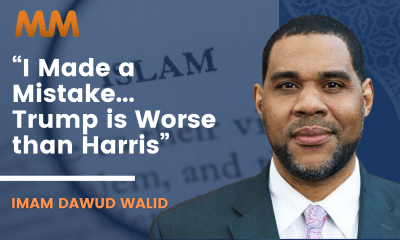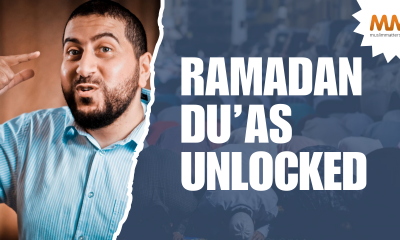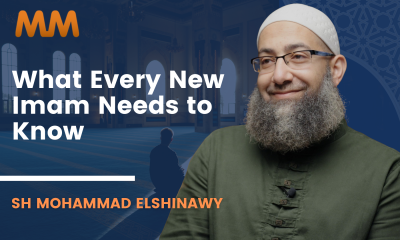[section_title title=Page 2]
Ten Points for People Asking Questions:
1.The person has to seek an answer to their religious questions in order to fulfill the direction given by God.
“Ask the people of knowledge if you do not know” (Qur’an 16:43).
Keep supporting MuslimMatters for the sake of Allah
Alhamdulillah, we're at over 850 supporters. Help us get to 900 supporters this month. All it takes is a small gift from a reader like you to keep us going, for just $2 / month.
The Prophet (SAW) has taught us the best of deeds are those that done consistently, even if they are small.
Click here to support MuslimMatters with a monthly donation of $2 per month. Set it and collect blessings from Allah (swt) for the khayr you're supporting without thinking about it.
You are fulfilling a divine injunction and seeking nearness to Your Lord, “God, I don’t know the answer to this. Guide me through this scholar whom I’m trusting with my affairs. I do so seeking your pleasure and fulfilling your command.”
Don’t lose sight of the fact that seeking an answer is a way of coming closer to God.
2. People of knowledge have to be qualified, fulfilling the conditions of scholarship in giving edicts. They also must be aware of the realities of the questioner and knowledgeable in detail about the topic at hand.
Find and ask
a) those who are qualified – who have studied or undergone traditional learning
b) those who are aware of the realities of your situation and understand your explanation of the details of your particular scenario,
c) those who you believe to possess characteristics of God-consciousness, upright moral character, and who lead by example,
d) and those you can trust.
3.You should try hard to seek and find a live person to question.
Fatwa banks, sites, and Google do not take into consideration an individual scenario. An answer that’s posted for a particular person may not entirely be right for you, or a general answer given may not be correct for your specific situation.
4. When soliciting a scholar for his opinion you need to give full details of your question.
Don’t solicit with partial details just “to see” what they say. This is dishonest.
5. Please understand that you are responsible for your religion. You have to be able to trust the person you’re asking.
For example, if you happen to be a finance specialist and are questioning a person who clearly has no understanding of economics, finance, or your question, then you have the full right to ask someone else who knows what they are talking about! The sin of answering without knowledge falls on the person giving the answers. Regardless of a person’s status, position in the community, or even attire – the onus of scholarship is on having knowledge of a matter. It is your responsibility to seek a qualified person when it’s apparent the one questioned is unqualified.
6. The fatwa given is NOT binding if you have the ability to ask someone else you can trust.
You have the full right to go seek an answer from someone else. If you have a feeling that the person giving you an answer did not understand your particular situation (financial, or personal for example), you can ask someone else.
Note: This does NOT mean that you are a judge of their academic or scholarly conclusions on fiqh matters – i.e. saying things like, “His authentication of such and such hadith is questionable, or his conclusion does not seem strong.” Simply, laymen are not qualified to make that kind of judgement and this could turn into fatwa shopping when one jumps from one person to another finding out “what someone has to say,” and then subsequently comparing and contrasting the answers they get. This is definitely not intended.
7. Don’t expect the person you’re asking to make life decisions for you.
Often times a fatwa serves as a guide in making a decision and at other times it gives a definitive yes or no. The important thing is to take responsibility on your part and not expect to live by the word of the person giving the fatwa.
8. When you receive an answer you do not have the right to then debate and try to convince others of the answer you have received.
This is not your role. You cannot apply an answer you were given to the specific scenarios of others. Discourse, debate, and engage others in matters that can bring about benefit, but in matters when it requires specialization of fatwa, that is not your role. You are not qualified for that.
In fact, remind others in the utmost polite way of this fact as well.
If we maximized our potential to benefit our community in what we’re both good and qualified in, it would solve half of the problem.
Note: The difference between this scenario, advising, or educating people about something they are ignorant in is very delicate. Educating someone is not the same as answering or enforcing a view that requires a ‘fatwa’ to their particular scenario. Instead it requires a gentle approach in helping them to seek knowledge or advising them in a matter. The most important way to differentiate what is fatwa is simple:, if an issue does require an answer to a specific scenario to consider a particular person’s situation then a qualified scholar should be involved.
Another key to understanding the difference between giving fatwa, educating, and advising: most people are in need of understanding agreed upon basics of Islam, things that will bring them closer to God. Don’t complicate approaching God by losing people in the minutiae.
9. Do not disparage others if they follow alternate but valid scholarly views.
This is also not your place.
If you happen follow a ‘lenient’ opinion on a given issue, don’t assume those following a more ‘conservative’ view are disrespecting the view you hold simply by virtue of them holding an opposing stance. Likewise, those following more conservative views should not disparage those taking a view opposing theirs, as long as they have been validated by scholars. The idea here is that both sides are following scholars they trust, hence arguments are not beneficial. You have an answer you trust – go with it and worship your Lord.
Banging your opinions on other people’s heads is not going to bring about unity; if you engage in discourse do so civilly. If you claim to be a student of knowledge, let your teachers handle and solicit detailed questions regarding authentication of text, the evidences of certain schools, etc. That’s what students of knowledge are taught and disciplined with. The key here is to understand what are considered valid opinions in orthodoxy, and scholars of tradition are your resource for this.
10. The answer you seek to an issue does not make the entirety of Islam.
It is a part of Islam — it makes up the application of your faith — but it is not the epitome of the faith.
Please do not get worked up to such an extent you lose sight of the essence of your faith by: a) excusing, not applying this issue, or b) overemphasizing this one issue as if it’s a central pillar of faith
Both are extremes that are unacceptable. The sharia is not a means to selectively read and implement what will justify our whims. We don’t selectively read the Quran and Sunnah to fit to our liking of practice. The sharia is to implement what God commands or forbids in context with the realities of contemporary struggles. The sharia is not intended to be an overextension of preconceived understanding that fits to our desires. Scholars seek the depth of knowledge to reach an understanding of the will of God, and teach it so, whether it is to the liking or disliking of people. This should be done with wisdom, appropriation, admonition, catering to case-specific scenarios, gradation, and under the guidelines of scholastic application.
Next Page Ten Points For Teachers and Those That Answer Religious Questions:


 #Islam2 weeks ago
#Islam2 weeks ago
 #Current Affairs1 month ago
#Current Affairs1 month ago
 #Islam1 month ago
#Islam1 month ago
 #Life1 month ago
#Life1 month ago
















GregAbdul
December 18, 2015 at 1:42 AM
May Allah forgive me, but we need to be honest. there is no group of Muslims hating other Muslims because they do not celebrate Mawlid. There are some intolerant Hanafis, but most, if they are educated are not. Non Muslims love to jump on Salafis and I met a brother who was so good and he was Salafi so I don’t like to say they are all bad, but there are many of them off the deep end and totally in love with all things Saudi. It’s like the Shia. If someone is hating you, but you are not hating them or what they like, it’s not fair to call the disagreement two-sided.
Mustafa
December 19, 2015 at 1:08 AM
Shia, Sufi, Barelvi and so on. The all commit practices I consider deviated(like Mawlid). But in this age where the best to walk the earth is more slandered and abused then ever before I can’t help but appreciate the intention behind what they do. As wrong as I consider them I recognize we are brethren of one Ummah who testify la ilaha illAllah Muhammadur Rasulullah, we pray salah in a similar form to the Messenger sallahualayhiwasalam in the direction of the Qibla and agree on the basics like the finality of Islam, it being the only path to Jannah along with deeds to accompany it.
In this age of tribulation and strife I think one way forward is to show Allah “I united with other Muslims on every front possible.” Where we can agree, lets remain in agreement and thank Allah we haven’t disagreed further than it. I recently read that there are something like 40 thousand(yes 40k!!!) different Christian groups. Alhamdulilah we have far fewer disagreements and when we do disagree it is usually over issues that aren’t of the absolute minimum.
There isn’t any doubt that these are all serious issues because everything legislated by Allah is a serious matter. But so is unity and if we can tell Allah “we did the minimum required we were commanded by you to stick together” then that’s one more responsibility we fulfilled before the we leave the earth.
We Muslims are commanded to obey Allah and His Messenger and that Muslims are passionate about these issues is no doubt a good thing insha Allah because it’s coming from a good place. The 5 M’s all have to do with what Allah and His Messenger commanded. However sticking together and unity is from the commandments of Allah and His Messenger so where we agree on the truth we ought to stick together.
May Allah guide us and save us from all evil!!!
Jamshed Hasan
March 24, 2016 at 1:00 AM
Assalamu Alaikum,
Ya Nabi Salam- Alaika for everyday.. every moment of our time…as Allah and His Angels are sending Durud and Salam all time….with all respect and love.. Mohammad SAW is the Mercy of Creation…
Sura Al-Azhab – Ayat 56, please read and research , Mawlid, Reciting durud, Kiyam, Nasid, any praising, Salam, durud is for everyday , we should fast on every Monday as this is great Sunnah as well.
” Inna Allaha wamalaikatahu yusalloona AAala alnnabiyyi ya ayyuha allatheena amanoo salloo AAalayhi wasallimoo tasleeman”
Meaing: Undoubtedly, Allah and His angels send blessings on the prophet the Communicator of unseen news, O you who believe! Send upon him blessings and salute him fully well in abundance.
English (Yusuf Ali): (Recite)
33:56 Allah and His angels send blessings on the Prophet: O ye that believe! Send ye blessings on him, and salute him with all respect.
Mahamoud Haji
December 18, 2015 at 3:27 AM
Jazakallah Kheir Brother Hasib. Weighty matter indeed in an age of confusion, intolerance and labeling. Ultimately it is the seeking of true knowledge with the aid of Allah, and not blind following, that will free us. May Allah guide us to the right path.
Blog Islam Barcelona
December 18, 2015 at 6:37 PM
Interesting,
Thank you!
Habeeb
December 21, 2015 at 5:56 AM
We are Muslims Canadians and love and respect all Muslims alike and tolerant to all faiths and cultures alike like Madina. Thanks
FM
December 21, 2015 at 9:06 AM
You lost me as soon as you started to preach that thorny “who has authority” and then lamenting lay Muskkms like me on our shortcomings. We hear this everyday anyway. What we need is questioning of “authorities” on promoting cult like thinking. What do you do when one “authority” says that the other “authority” actually has no authority? How do we know who do we trust?
Yes, we need specialties and we go to professionals to seek answers when we need them as you stated in your piece but we are not legally or morally bound to accept their professional advices. They are no “go between” between us and a supreme being.
Just two days ago I read the fatwa from a very respected looking scholar that those who celebrate Mawlid are evil and Satanic. Now, I am against celebrating Mawlid as well but just as overwhelming majority of lay Muslkms do in these situations, I do not have any problem with those who do. In fact, I have attended quite a few on the invitation of friends who do celebrate. So now based on the evidence from this scholarly opinion, I am supposed to believe that those who are celebrating Mawlid are evil and satanic? Okay, I won’t but there will be many others who will. And do I have the right to challenge this scholarly authority? Or I would be told in step 1 that “you do not have the authority” or “you cannot understand the deen because you do not possess the KNOWLEDGE, so you should surrender to this fatwa”. What is the mechanism for lay people like us to challenge the authorities? And are they ever taught to listen to these challenges with open mindedness even if it means questioning what they have believed?
i can go on and on but the point is that no real change can come in the Muslim community until either the authorities change or the community makes them accountable for what they say and how they act without the fear of being called “kafir” or “astray Muslim” (later is only a kinder way of saying the former), or in worst cases, fear of getting a permit to hell by a so called riteous Muslim who wouldn’t mind taking the fatwa against you to the next level where you don’t deserve to live anymore.
I hope this will be published but I have my doubts based on past experiences :)
Mustafa Mahmud
December 21, 2015 at 10:34 AM
Fuqaha are not what they used to be. Nowadays an actual heresy will run rampant and some daees, scholars will be ranting about raf ya dayn which is a fiqh issue or mawlid which they strongly believe to be innovative.
On Al Jumuah (website) there is a good article on how it is absurd to blame laymen alone and excuse certain members of the religious classes.
Mustafa Mahmud
December 21, 2015 at 10:37 AM
BTW I strongly believe Mawlid should be avoided but subhanAllah we’ve got an onslaught of kuffar telling us to not give our Messenger his due status, to abandon Sharia to believe that they can go to Jannah and more.
Refute mawlid raf ya dayn or whatever. But for God sake take some time out to talk about what is actually relevant and of far greater severity(kufr vs bidah it isn’t hard to tell.)
Yacoob Vahed
December 23, 2015 at 11:17 PM
I think it was Ali (RA) who said that when people know a little about something they concentrate on the minor issues.
Let’s look at the Bigger Picture always – we will then learn to appreciate the good and leave out the small differences with respect and dignity. We should however always strive to practice evidence-based Islam but always remember the TOLERANCE and CHARACTER of the Prophet (SAW) when guiding others. Let’s have Mercy unto one another and unite against the Kuffaar as the Quraan instructs us to do. Look at the overall good in the Muslim and inshaAllah he/she will learn from you without your instructions.
Steven
December 23, 2015 at 11:49 PM
Perhaps the problem is that so many people are seeking to learn about the religion in order to use it to chastise others instead of learning it to increase their chances of entering paradise. If we really wanted to make it into paradise we would never, with all our faults, have the time to worry about what others are doing.
M.Mahmud
December 24, 2015 at 10:25 PM
Muslims are commanded to simultaneously enjoin on what is right and forbid what it wrong, to affirm what is true and to reject what is false, all while fearing for ourselves and for others.
This is the way of the Messengers and whoever followed guidance.
javaid
January 8, 2016 at 10:14 PM
I was relatively tolerant of Mawlid even though I considered it a Bidah. I was tolerant because I thought to myself that they do it for the love of Prophet(sa) and because we had more things to worry about.
But I realized that Mawlid celebrations are getting insane by every passing year with huge cakes, models of Madinah, disco songs, even inviting women-dancers and what not. Now I think that Mawlid is a Munkar which must be warned against and stopped. Not just ignored.
Another fact to mention is that some people quote Ibn Hajar Asqalani and others, even by their standards and by the standards of the genuine classical scholars who allow this, the Mawlid of today is a far bigger deal and clearly a Munkar.
Ghufran Ali Muzaffar
January 20, 2016 at 12:23 AM
Its a great blog and really leraned alot from this blog. I think Their is another M you should include and that is “Money”. Which is the biggest cause for discrimination between different sects and culture
Ali
July 1, 2016 at 4:44 AM
As Salaamu Alaikum
The Purpose of the Kuffar was to divide and conquer and they have successfully done so!
As we see the Muslims being constantly defeated by the western forces today, as well constantly arguing amongst one another!
The current Saud Family is a tribal Family put in power by the Kuffar, remember that tribalism is forbidden in Islam, the split began with Abdul ibn Wahhab, he was the one who caused the rift which lead to the Ottomans leaving Arabia and the beginning of the SalafI movement.
If Islam was the way the Saudis are running the blessed Cities than Nabi Muhammad (saw) would have elected Hazrath Ali as the 1st Caliph and it would have stayed within the family of Muhammad peace be upon upon.
Islam is about Just and fairness not who has the most money will be in power!
Alex
May 21, 2020 at 9:14 AM
Salam aleykum.
Very interesting post.
Thanks!